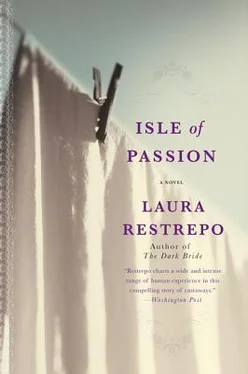“Why didn’t you ask for help?” Benita asked him.
“When I did, you all tried to kill me.”
Victoriano told about the beating he had suffered the day Irra’s family was laid down.
“Those who beat you up are all dead,” the woman said. “Come home with me. Mrs. Arnaud and the others will welcome you.”
The man accepted, but on the way he drew a knife and pressed it against her neck.
“‘First I need to have a woman, so lie down,’” Victoriano demanded, Benita said.
“Oh, my God! And what did you do?” Alicia asked, terrified.
“Lie down, ma’am, what else could I do?” answered Benita, without offering any explanation. “He’s here now, around the corner, waiting for permission to come in.”
Alicia sent for him. First they perceived the stink of someone who, though reprieved at the last moment, still had the smell of death. When he crossed the threshold, the women found themselves face to face with the cliff monster. It was all true: scurvy, arthritis, and rickets had turned Victoriano Alvarez into a fright. Yet they were glad to see him, and after a while they got used to the way he looked. He was in a sorry state, but it was good to have a man around.
“You’re in bad shape, but you are alive, Victoriano,” Alicia said to him.
“But not thanks to you.”
“We are not alive thanks to you either. But this is no time for recriminations. We can help you, and you can help us. Provided you behave. You abused Benita, and that was evil. If you want to live with us, you cannot do that again, ever.”
“I needed to be with a woman, after so much loneliness.”
“Next time, you have to ask her whether she also wants to be with you.”
“And if she doesn’t want to?”
“Then you have to do without, as we do.”
They brought him food, and he spoke again of his struggle for survival.
“In the end, we are the only ones left, you and us,” Alicia said. “It’s not so strange, women and blacks are the most resilient races on the planet.”
“And you have turned black.”
“Why, yes, that’s true, we’re dark like you now. The sun made us all look alike.”
“The sun and the suffering, ma’am, have toughened our skin.”
“If suffering darkens people, Victoriano, our souls must be coal black.”
As he bid farewell to return to the lighthouse, they brought him one of the bedsheets, a spoon, and a few other utensils he had asked them to lend him. They saw little of him during the following days. They knew sometimes that he was around because they could perceive his deathly stench, and because they learned to recognize the rattling of his bones and his limping steps. Alicia and Tirsa suspected that the purpose of his visits was to meet furtively with Benita. Once in a while he came by the house, bringing seafood or fish. The women would feed him, and he would sit around to ruminate the food in his misshapen mouth, without saying a word. They gave him any available remedies and some cod liver oil that they had extracted themselves. Rubbed in well, this warmed his body and offered some relief for his rheumatism. They made a paste out of ground mother-of-pearl to treat his old scars, which he complained still itched and burned.
Late one night they realized that Benita had not returned home. They searched around calling her, but she did not respond. They thought she probably was in the lighthouse lair and went for her. Victoriano was at the door, blocking their entrance.
“We have come for Benita.”
“She is staying with me, and you’re not taking her away from here.”
“Benita, do you want to stay?” shouted Alicia.
“Yes, ma’am, I’m staying,” came her voice from inside.
For several weeks the women did not meet either of them, until one morning while collecting shrimp by the ocean-bathed cliff. It was Rosalía who found Benita’s body. Her head was split, and she had red marks all over her body.
“She fell off the cliff and broke her neck, poor thing!”
“What are those things on her body? All those red marks.”
“They are Judas kisses.”
“An octopus sucked her dry.”
“No,” Tirsa said slowly and with sorrow. “Victoriano beat her up, then killed her. And he’s coming to take another one of us with him.”
That same night, they heard him come near, invisible in the dark. When the air turned rancid and they heard femurs and tibias clatter, Alicia and Tirsa came out to face him, pushing their big pregnant bellies ahead of them.
“You are a murderer, and you’re not coming into the house.”
“I can go in anywhere I want to, because now I am the governor.”
The clouds that were hiding the moon parted like a curtain, and a chalky light spread over everything. They were then able to see the ferocious aspect of the tattered leper pirate: he had three daggers tucked under his belt, a rifle in bandolier, and he was wielding a heavy club.
“Why did you kill her?”
“I killed her for being a disrespectful lazybones. Now I am the governor, see. I’m in command, and all the women are mine for whatever I want. I’ll take you two with me after you give birth.”
“You will pay for your crimes, Victoriano,” Alicia threatened.
“Oh really, ma’am. And who will make me pay? You?”
“Justice, when we are rescued.”
“Nobody is going to come, and if they do, I’ll kill all of you first, so there will be no tattletales left. If you don’t want a beating now, don’t stand in my way, because I’m going in.”
With a hard swipe of his left arm, he broke into the house and grabbed Altagracia. He jostled her, brought her down, and dragged her by the hair. Her long, blue-black, shiny hair.
“I’m taking this one with me,” he said, “so she can cook for me and be my woman.”
He walked away, tottering painfully on his shaky legs, with Altagracia on his shoulder. Eyes closed, ears and mind closed in order not to see, not to hear, not to feel, she let herself be carried like a sack of flour. Her hair was dragging, sweeping the floor and leaving a track through the pebbles and seashells.
A few hours later, Alicia went into labor prematurely. It was a baby boy, ethereal and fragile like a sigh, and no one doubted that such an angelical face would soon return to heaven. In order not to let him be held back halfway there, suffering in purgatory, they baptized him immediately with water on his head and salt on his mouth, and they named him Angel Miguel after Ramón father. Alicia was not even able to breast-feed him.
“You’re so anguished the milk cannot come down,” Tirsa told her.
The baby was kept alive with teaspoonfuls of coconut water and booby egg whites until Tirsa’s delivery. She had a baby girl, big and strong, and named her Guadalupe Cardona. Tirsa breast-fed both babies and neither was ever satisfied. They cried all the time. Lupe screamed loudly, and the boy squealed like a sick little bird. But neither wanted to die, and both consciously clung to life.
Alicia and Tirsa knew that the time had come to face Victoriano. They had some weapons, a few guns and regulation rifles, but no ammunition. They had run out of that years before.
“It is as useless as still keeping your mother after she’s dead,” Tirsa commented.
In spite of his condition, Victoriano was still powerful and an excellent shot. Adversity had made him evil, cruel, and fierce. He presented a terrible challenge for them, like an unconquerable mountain.
“We must kill him, no matter what. It’s our duty.” Tirsa was really firm on this.
“Our only duty is to stay alive, for the sake of our children,” Alicia countered, equally firm.
Their disagreement and their fright paralyzed them, and even though they were overwhelmed by the certainty that for Altagracia each minute could be her last one, they spent evenings discussing what to do, but without taking any action. They finally found a compromise. They would try to kill him, but without risking getting killed by him.
Читать дальше












